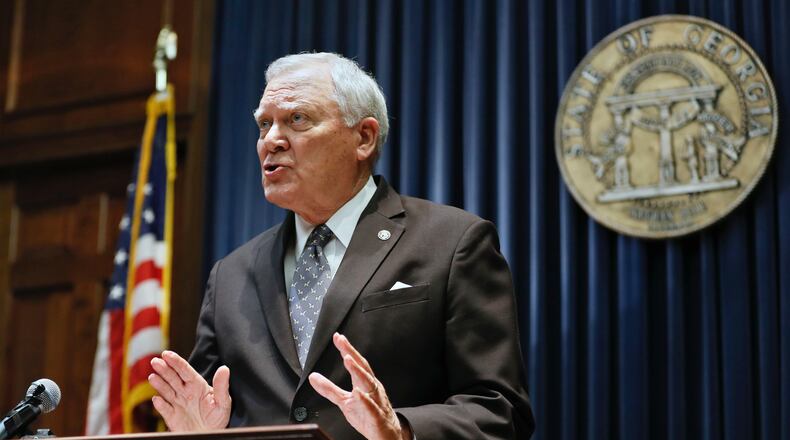Gov. Nathan Deal’s tax breaks for tree farmers and airlines, plus his plan to spend $270 million helping to clean up and rebuild southwest Georgia after Hurricane Michael devastated the area, easily passed their first tests Wednesday.
Deal’s spending plan won approval from the Georgia House Budget Committee after he pulled money for two nonstorm-related projects and redirected it to hurricane relief.
“Our state has been struck by a disaster unlike any we have really seen,” Deal told lawmakers. “The losses sustained will have to be dealt with.
“Obviously, we cannot pay for all of the losses, nor should we be expected to pay for all the losses. We do think we can afford to do this.”
The proposals go before the full House for a vote Thursday.
The tax bills would provide $200 million worth of income tax credits to timber and pecan farmers for replanting trees they lost and would sustain Deal's executive order suspending the state collection of jet-fuel taxes through June 30. Deal's order, and an earlier decision by the state to stop collecting local jet-fuel taxes, saves Delta Air Lines about $40 million a year and other airlines millions more.
The spending measure — which would raise this year’s overall state budget to about $26.5 billion — would provide $69 million in emergency relief to local and state agencies, $69 million for debris removal, $55 million to assist farmers facing substantial crop losses and damage, $40 million to rebuild and help spur economic growth in the region affected by the storm, $20 million to address recovery and cleanup efforts by timberland owners, $9 million for damaged state facilities and $8.2 million to replace damaged firefighting equipment.
Deal also had originally proposed some nonstorm-related spending: $35 million for a new technical college aviation academy in Paulding County and $9.3 million for the private Mercer School of Medicine to establish a campus in Columbus.
“Both of these are worthwhile projects,” Deal said. But the governor on Wednesday asked that all the money be directed to storm recovery.
Republican state Rep. Sam Watson, a farmer from Moultrie, told the Budget Committee, "The landscape of southwest Georgia has been changed for many years to come."
Georgia Agriculture Commissioner Gary Black said that may be particularly true for pecan farmers, whose losses are estimated at $600 million. Many of the pecan trees and much of the business, he said, “has been vaporized from southwest Georgia.”
“The pecans are gone. We are the No. 1 pecan-producing state in the nation,” he said, “but we may not be able to say that again for a generation, if ever.”
He said the state can’t afford to forget the devastation of Hurricane Michael.
Chuck Williams, the director of the Georgia Forestry Commission, said state officials have to keep a close eye on the area in coming months because there is so much debris on forest floors — such as fallen trees and branches — that could provide kindling for major wildfires.
Before the budget hearing, the House Ways and Means Committee quickly passed the tree replanting tax credit and the tax break for airlines.
Action on the airline bill was needed because Deal signed the executive order this summer. Under state law, the General Assembly must ratify or reject such orders at the next legislative session.
State Rep. Trey Rhodes, R-Greensboro, one of the governor's floor leaders, repeated some of the same points airlines have used to sell the tax break: that Georgia is competing with states that have either no jet-fuel tax or much lower rates.
He said Georgia has lost some cargo shipping business because of the tax.
“We anticipate we will see some reinvestment into our state that will create many jobs,” Rhodes said, if the tax is suspended.
The General Assembly appeared poised earlier this year to approve a tax break for all jet-fuel users until Delta broke marketing ties with the National Rifle Association, a move guaranteed to cause trouble in an election year. The decision followed the mass shooting at a Parkland, Fla., high school that left 17 people dead.
Delta's action infuriated some conservatives and prompted each of the leading GOP candidates for governor to oppose the tax exemption. Lt. Gov. Casey Cagle, the Senate's president and then a leading Republican candidate for governor, was the most aggressive: His vow to block the legislation effectively killed it, despite Deal's objection.
Riley sent word to lawmakers on Friday that the governor would only be asking them to approve the jet-fuel break through the end of the fiscal year, June 30. The governor would like it to continue longer, but members of the General Assembly will decide that when lawmakers convene for the regular session in January.
General Assembly special session
Key state House committees on Wednesday passed the three major elements of Gov. Nathan Deal’s call for a special session:
- About $270 million in spending to clean up and repair areas of southwest Georgia devastated in October by Hurricane Michael
- A 10-year, $200 million tax break for farmers and landowners designed to get them to replant trees in the region
- Continued suspension of the collection of jet-fuel taxes through June 30, a coup for Delta Air Lines
About the Author
Keep Reading
The Latest
Featured




